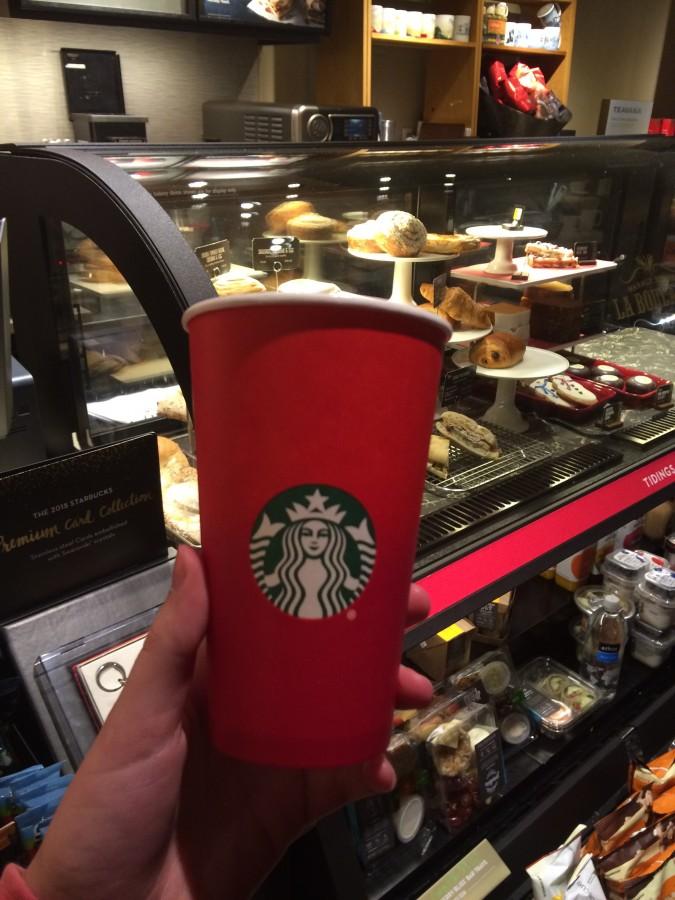Merry Christmas: political correctness makes mark at Starbucks
In light of Starbucks’ new design plan for their holiday cups, many individuals are upset, if not outraged about the global company taking off their references to the holiday in favor of a more clean and minimalistic approach to their holiday branding.
Their new design approach is to sell a cup with the current Starbucks logo, superimposed upon an ombre red background. This new lack of holiday references, besides the red color choice, has many Christian holiday-celebrating individuals at least a bit bothered, if not outright offended.
Joshua Feuerstein is one of many radical Christian individuals whom has expressed his lack of enthusiasm for the recent change in holiday style. “Starbucks REMOVED CHRISTMAS from their cups because they hate Jesus,” wrote Feuerstein on Facebook.
And while this is an extreme view, Feuerstein also urged his followers to say their names as “Merry Christmas” so that Starbucks employees would be forced to say it, even when they were asked to avoid it, as it could offend their customers of other religions or non-religious affiliations.
“Starbucks has become a place of sanctuary during the holidays,” said Starbucks vice president of design and content, Jeffrey Fields. He explained this year’s design as a, “More open way to usher in the holidays.” Many individuals blame political correctness for “the war on Christmas”, yet there was never a “war” in the first place, merely an adjustment – and here’s how.
Political correctness seeks to represent situations in a way that does not bring offense to the group that situation may pertain to. So in this case, the situation is the new Starbucks holiday cup, and the group it seeks to avoid offense is, well, everyone. Christmas is originally a Christian holiday, and that holiday is starting to become more commercialized in a way that produces many polarizing opinions.
As we know it, Christmas is going through a slow evolution of how we choose to celebrate or not celebrate that holiday. Commercialism of the religious holiday was a huge leap in that evolution when people were able to enjoy some of the practices such as, spending time decorating a Christmas tree with your family and friends without being required to participate in the Christian religion.
That being said, this is possibly the only major holiday that represents two such groups: the traditional religious practice and the commercial practice. I feel the most important variable in this equation is to differentiate between the religious appropriation of the Christian religion vs. that of any other religion.
Starbucks has taken on a very interesting paradigm of this subject. Like many businesses, they have chosen to not only open up their branding to such a holiday, but they’ve also decided to open up their holiday branding to everyone – meaning those who also celebrate the religious holiday minus the religion. If this were the case of a different religion such as Starbucks making a cup with the image of Buddha, Krishna, or Allah, then that could be considered cultural or religious appropriation.
Cultural appropriation is when you use a facet of a group as a form of decoration or fashion without its regard to the context of that group. So let’s say Starbucks designed and distributed a cup with the image of Buddha with no connection to the actual religion. They just thought it looked interesting on their cups and that it seemed “down to earth”.
That is cultural appropriation, and it is considered extremely disrespectful. Starbucks has not done this, and has in fact avoided any major form of disrespect simply because they have removed any references that could target any religious group. This opens their holiday branding to everyone, so everyone can enjoy their holiday Starbucks cup without feeling awkward about having an angel or a nativity scene as part of its design.
In conclusion, there are ways to offend those who practice Christianity, and especially practice the Christmas holiday with religious intentions, but redesigning your cup to cater to everyone for a change does not fall within that category.
According to the Pew Research Institute, 51% of American citizens say that Christmas is more of a religious holiday, while 32% say it’s more of a cultural holiday, along with another 9% saying that it is “both or other”. As an individual who is not a part of that majority, it pleases me to see that I am allowed to be included into a special holiday without having to think that the religious imagery does not apply to me – thus distancing those who do and do not celebrate the holiday.

Grant Spicer is a Senior and second year staff writer for The Sidekick. Grant specializes in writing opinions articles and answering those difficult questions.



